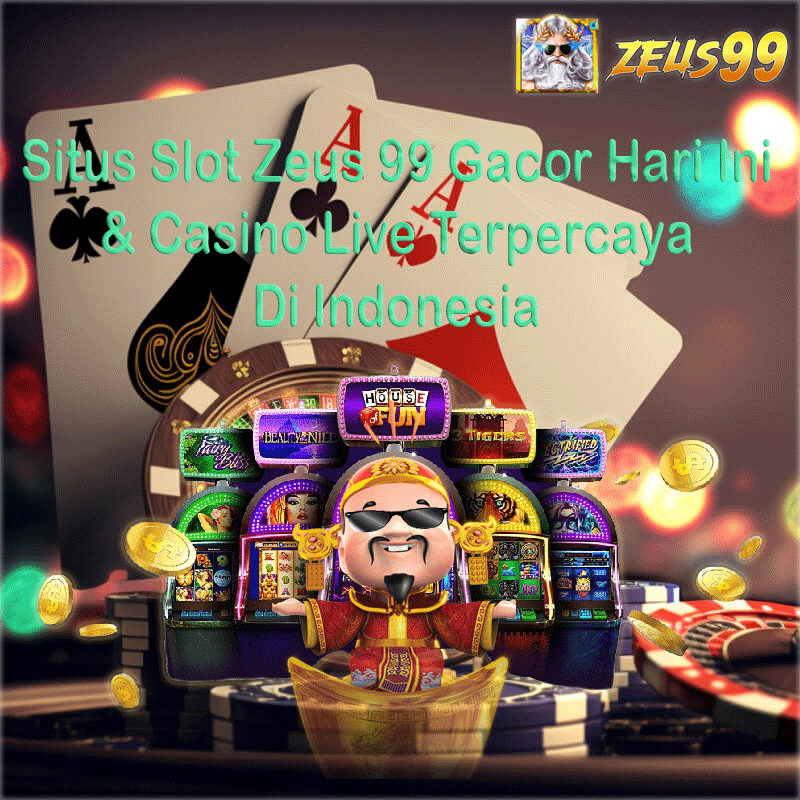
Situs Slot Zeus 99 Gacor Hari Ini & Casino Live Terpercaya Di Indonesia
Zeus99 Slot Online hingga Casino Live Terbaik Di Indonesia dunia online Zeus Slot yang berkembang pesat, permainan slot online telah menjadi salah satu yang paling populer di antara casino live para pemain. Dengan berbagai tema yang menarik dan hadiah yang menggiurkan, slot online menawarkan pengalaman yang tak tertandingi bagi para penjudi. Namun, di tengah popularitas slot online yang terus meningkat, pengembang permainan telah mulai memperkenalkan varian baru yang menggabungkan keasyikan slot dengan sensasi Live Casino Zeus 99. Dalam artikel ini, kami akan menjelajahi bagaimana perpaduan antara slot online dan Situs Casino langsung memberikan pengalaman perjudian yang lebih mendalam dan memuaskan.
Cara Main Slot Online: Keseruan di Ujung Jari Anda
Slot online telah menjadi raja dalam dunia perjudian daring paling banyak peminat mengingat keunggulan yang bisa diperoleh menjadi salah satu game terpopuler. Dengan berbagai tema yang kreatif, grafis yang mengagumkan, dan efek suara yang menghibur, daftar zeus slot online menawarkan pengalaman bermain yang mengasyikkan bagi para pemain. Fitur-fitur bonus, putaran gratis, dan jackpot progresif menambahkan kegembiraan dan peluang besar untuk memenangkan hadiah besar.
Di sisi lain, pengalaman bermain di Daftar Casino Zeus 99 langsung menawarkan sensasi yang berbeda dan lebih autentik Slot Zeus 99. Dengan dealer langsung dan interaksi real-time dengan pemain lain, Agen Casino langsung membawa atmosfir Casino Online Indonesia ke dalam kenyamanan rumah Anda. Pemain dapat merasakan tegangnya taruhan dalam permainan seperti blackjack, roulette, dan baccarat sambil berinteraksi dengan dealer yang ramah dan profesional.
Daftar Slot Online Casino Live
Dalam upaya untuk menyatukan keunggulan dari kedua dunia, pengembang permainan telah mulai memperkenalkan varian baru yang menggabungkan slot online dengan elemen Casino Terpercaya langsung. Ini berarti pemain dapat menikmati keasyikan slot favorit mereka sambil menikmati interaksi real-time dengan dealer langsung.
Fitur-Fitur Menarik dalam Permainan Hybrid
Permainan hybrid ini menyertakan fitur-fitur menarik seperti mode bonus interaktif yang menghadirkan dealer langsung mainkan link zeus slot 99, putaran bonus yang disiarkan secara langsung dari studio casino, dan turnamen slot langsung dengan hadiah besar. Pemain dapat merasakan sensasi Casino Baccarat langsung sambil tetap menikmati keseruan slot online yang mereka cintai.
Dalam dunia perjudian daring yang terus berkembang, pemain mencari pengalaman yang lebih mendalam dan menarik. Meja casino live dan game slot online telah menjadi dua pilihan utama yang menyediakan hiburan yang tak tertandingi bagi para penjudi daring. Dalam artikel ini, kami akan menjelajahi bagaimana penggabungan meja casino live dengan game slot online menghasilkan pengalaman perjudian yang lengkap dan memuaskan, serta bagaimana hal itu dapat meningkatkan visibilitas dan peringkat situs web Anda melalui pendekatan SEO-friendly.
Meja casino live telah menjadi pilihan yang populer di kalangan penjudi daring yang mencari sensasi dan interaksi yang lebih nyata. Dengan dealer manusia yang mengoperasikan permainan secara langsung melalui siaran video, pemain dapat merasakan atmosfir Zeus99 Casino Sic Bo fisik tanpa harus meninggalkan kenyamanan rumah mereka. Permainan seperti blackjack, roulette, baccarat, dan poker dapat dinikmati dalam format yang real-time, dengan kemungkinan interaksi antara pemain dan dealer yang membuat pengalaman lebih menarik.
Slot Online: Kesenangan Tak Terbatas di Ujung Jari Anda
Di sisi lain, game slot zeus 99 online telah menjadi fenomena dalam dunia perjudian daring. Dengan berbagai tema yang menarik dan fitur-fitur bonus yang mengasyikkan, slot online menawarkan hiburan yang tak tertandingi bagi pemain dari berbagai latar belakang. Dari slot klasik hingga slot progresif dengan jackpot besar, ada sesuatu untuk semua orang di dunia slot online yang kaya akan variasi dan kegembiraan.
Penggabungan Game Slot dengan Meja Casino Live Kombinasi yang Menarik
Demi memenuhi kebutuhan dan keinginan pemain, banyak operator Situs Zeus Slot 99 perjudian online telah mulai menggabungkan game slot online dengan meja casino live. Ini memungkinkan pemain untuk menikmati berbagai permainan favorit mereka dalam satu platform yang mudah diakses. Sebagai contoh, pemain dapat mengalihkan perhatian dari permainan blackjack langsung ke putaran slot online yang menghibur, atau sebaliknya, tanpa harus keluar dari situs web.
Penggabungan game slot online dengan meja casino langsung menyajikan fitur-fitur menarik seperti turnamen slot live yang diselenggarakan secara berkala dengan hadiah besar, promosi eksklusif yang mencakup putaran gratis untuk digunakan dalam Slot Casino zeus99 tertentu setelah bermain di meja live, dan integrasi sistem loyalitas Situs Slot yang memungkinkan pemain mendapatkan poin atau hadiah lainnya saat bermain baik di meja langsung maupun dalam game slot.
